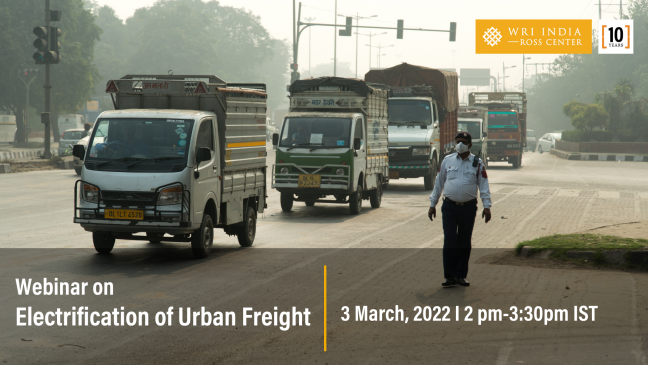Electrification Of The Urban Freight Sector - Strategies, Challenges And Way Forward

India’s freight sector plays an important role in ensuring speedy, efficient, and economical transport of goods across the country. Today, close to 71% of the freight transported in the country is completed on road. Thus, road freight movement contributes significantly to transport related air pollution in the country accounting for ~220 million tons in 2020 alone. Studies have estimated that these emissions could grow to over 1,214 million tons by 2050.
Bengaluru is anticipated to be one of the world's fastest-growing economies by 2035, with an annual GDP growth rate of 8.5 percent. It is India’s IT hub and home to giant start-up spaces, e-commerce and hyper-local delivery companies. Today, 44% of the goods traffic movement in Bengaluru is inbound, 36% is outbound and 20% is cross-cutting. Yearly vehicle registration data shows that the growth of logistics vehicles in the city is on course to surpass numbers logged in the pre-pandemic years. This implies a potential increase in congestion and pollution not just within urban limits but also in the suburbs of the city. There is, thus, a need to not only plan for a more efficient movement of urban freight in the city, but also to adopt cleaner technologies to decarbonize the sector.
Over the last decade, electrification has been prioritized as a key strategy to decarbonize the transport sector in India. While much effort has been directed to the electrification of private and public passenger transport, the push for the electrification of the freight sector, contributing ~45% of the transport related pollution in the country, has been limited.
This panel discussion will highlight the four main challenges limiting the electrification of the freight sector in Bengaluru.
- Lack of data on urban freight movement: Since urban logistics activities are mostly managed by the private sector, there is a lack of data on freight movement in the city required to improve the efficiency and decarbonization of the freight sector.
- Regulatory gaps: While Karnataka’s EV policy targets the complete electrification of Light commercial vehicles in the state by 2030, the policy’s provisions to incentivise this transition is limited.
- Technological hurdles: In addition to challenges regarding weight of the battery required to carry large payloads and travel long distance, the topography, climate, temperature, and road conditions also affect the performance of e-Freight vehicles.
- Lack of financing options: Owing to the lack of clarity on the lifecycle, performance, and viability of e-Freights, this sector has extremely limited financing options with companies having to rely on investor capital or customized financing packages with Non-Banking Financing Companies.
This panel discussion will bring together public and private sector representatives who will play a key role in the electrification of the freight sector. These include representatives from state and local governments, private logistics operators and aggregators, manufacturers, and financers to shed light on the challenges faced by each of these stakeholders and the way forward.
SPEAKERS
- Rajender Kataria, IAS, Principal Secretary, Transport Department, Government of Karnataka.
- Aayushi Jain, VP, External Relations, MoEVing.
- Pratyush Tiwari, Head of Operations, EVage.
- Dr. Amitabh Saran, CEO, Altigreen Propulsion Labs.
- Pushkar Singh, CEO, LetsTransport
- Dhiraj Agrawal, Sr VP, CEO TW & EV Business, Manappuram Finance.
- Pawan Mulukutla, Director, Clean Mobility and Energy Tech, WRI India
- Krithi Venkat, Senior Project Associate, WRI India.

